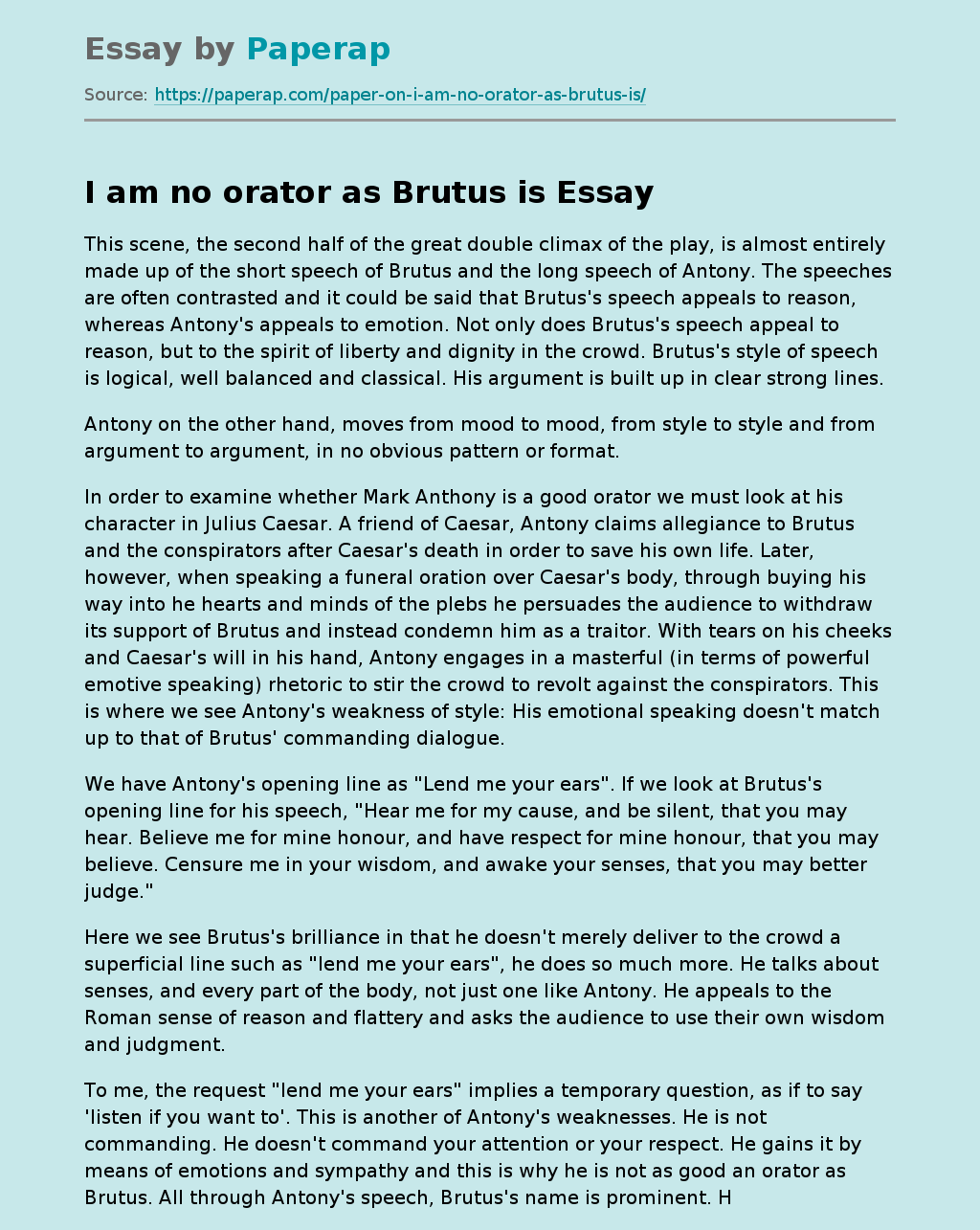Play by William Shakespeare Julius Caesar
The following sample essay talks about William Shakespeare’s play Julius Caesar. Read the introduction, body and conclusion of the essay, scroll down.
This scene, the second half of the great double climax of the play, is almost entirely made up of the short speech of Brutus and the long speech of Antony. The speeches are often contrasted and it could be said that Brutus’s speech appeals to reason, whereas Antony’s appeals to emotion. Not only does Brutus’s speech appeal to reason, but to the spirit of liberty and dignity in the crowd.
Brutus’s style of speech is logical, well balanced and classical. His argument is built up in clear strong lines.
Antony on the other hand, moves from mood to mood, from style to style and from argument to argument, in no obvious pattern or format.
In order to examine whether Mark Anthony is a good orator we must look at his character in Julius Caesar.
A friend of Caesar, Antony claims allegiance to Brutus and the conspirators after Caesar’s death in order to save his own life. Later, however, when speaking a funeral oration over Caesar’s body, through buying his way into he hearts and minds of the plebs he persuades the audience to withdraw its support of Brutus and instead condemn him as a traitor. With tears on his cheeks and Caesar’s will in his hand, Antony engages in a masterful (in terms of powerful emotive speaking) rhetoric to stir the crowd to revolt against the conspirators.
This is where we see Antony’s weakness of style: His emotional speaking doesn’t match up to that of Brutus’ commanding dialogue.
We have Antony’s opening line as “Lend me your ears”. If we look at Brutus’s opening line for his speech, “Hear me for my cause, and be silent, that you may hear. Believe me for mine honour, and have respect for mine honour, that you may believe. Censure me in your wisdom, and awake your senses, that you may better judge.”
Here we see Brutus’s brilliance in that he doesn’t merely deliver to the crowd a superficial line such as “lend me your ears”, he does so much more. He talks about senses, and every part of the body, not just one like Antony. He appeals to the Roman sense of reason and flattery and asks the audience to use their own wisdom and judgment.
To me, the request “lend me your ears” implies a temporary question, as if to say ‘listen if you want to’. This is another of Antony’s weaknesses. He is not commanding. He doesn’t command your attention or your respect. He gains it by means of emotions and sympathy and this is why he is not as good an orator as Brutus. All through Antony’s speech, Brutus’s name is prominent. He mentions him on so many occasions, one begins to wonder who Antony is actually talking about. “Brutus hath told you Caesar was ambitious. If it were so, it was a grievous fault, and grievously hath Caesar answer’d it. Here under leave of Brutus and the rest come I to speak in Caesar’s funeral. He was my friend, faithful and just to me; but Brutus says he was ambitious, and Brutus is an honorable man…”
It is as if he has to mention Brutus’s name to keep the crowd’s attention.
In the end, he pulls out Caesar’s Will, which bequeaths all of Caesar’s private gardens and walkways to the people of Rome. This is the final straw against the conspirators because it proves to the commoners that Caesar would have been a just ruler, and not at all ambitious, which is exactly why Brutus condoned Caesar’s assassination.
In conclusion, Brutus is an exceptionally eloquent speaker, and I agree with Anthony’s self assessment. Antony wins the crowds attention by means of something that is not entirely genuine in that it is a very temporary moment that is quickly forgotten, even though the plebs are exceptionally fickle. Technically, Brutus is the more articulate and logical speaker, however, the power of emotional rhetoric holds its ground and considerably sways the plebs in their decision.
Regardless of Antony’s gift it is clear that Brutus is the better orator of the two and that is why agree with Antony’s self assessment, however, I do understand why, on this occasion straight oratory was not what was required and Antony is the victor.
Play by William Shakespeare Julius Caesar. (2017, Oct 19). Retrieved from https://paperap.com/paper-on-i-am-no-orator-as-brutus-is/

